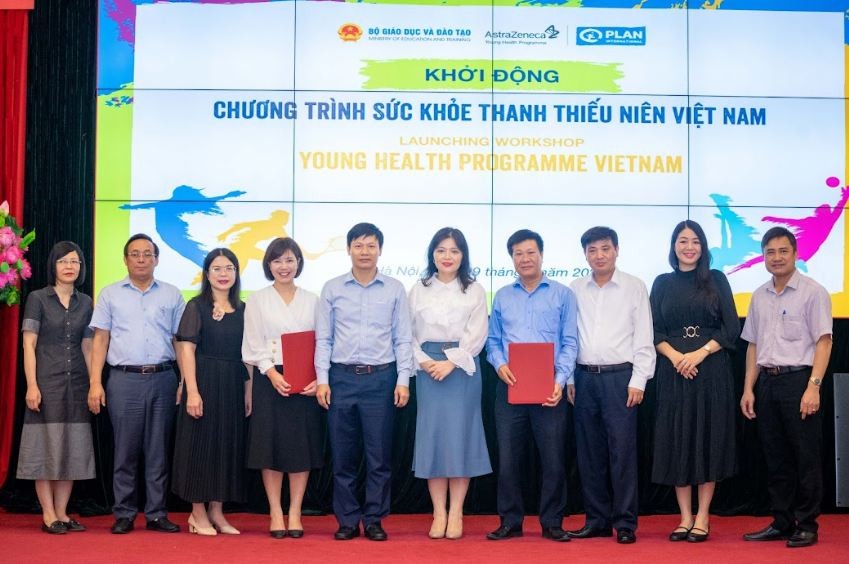The Young Health Programme (YHP) Vietnam – Phase 2 has been officially launched by the Ministry of Education and Training, AstraZeneca, and Plan International Vietnam.
The program is a global community investment initiative of AstraZeneca focusing on youth and prevention of the most common non-communicable diseases (NCDs) such as cancer, diabetes, heart disease, and respiratory disease. The program will be implemented from June 2023 to December 2025.

|
| Adolescents and youth are tremendous resources that are overlooked in the fight against NCDs, yet they are a natural partner for preventing NCDs. |
Lifestyle illnesses
According to the World Health Organization (WHO), NCDs accounted for 77% of all deaths in Vietnam in 2018. In 2014 and 2011, NCDs were estimated to account for 73% 2 and 75% of all deaths in Vietnam respectively, indicating a plateauing or slightly increasing trend in the prevalence of NCDs.
Vietnam’s population is estimated to be more than 98 million in 2023, and young people aged 10-24 years constitute about 21% of the population. The WHO estimated the probability of premature death (between 30 and 70 years) from NCDs in 2018 at 17% (23% men, 11% women) in Vietnam, the same as the 17% estimated in 2014. Cardiovascular disease and cancer are the most prevalent causes of NCD-related death, accounting for 31% and 19% respectively.
The Young Health Programme Vietnam – Phase 2 is a three-year program that aims to contribute to the improved health and well-being of
young people
between 10-24 years of age.
Along with public awareness campaigns, school activities are to be carried out in Cau Giay, Long Bien, Dong Anh, and Hai Ba Trung Districts of Hanoi. Specifically, YHP aims to ensure that young people have increased knowledge about risky behaviors and NCD prevention, which gives them greater capacity to make informed decisions about their health, in the context of improved health services, an enabling support system, and a policy environment.
AstraZeneca and Plan International Vietnam will work closely with the Department of Physical Education, Ministry of Education and Training, and other stakeholders to deliver the program.
Globally, the AstraZeneca Young Health Programme has reached more than 10 million youth in more than 40 countries across 5 continents since it was launched in 2010. In May 2019, the YHP earned AstraZeneca the ‘Business of the Year’ title at the Business Charity Awards, recognizing the company’s outstanding contribution to good causes. AstraZeneca was acknowledged for directly investing in building an evidence base, establishing the foundation for a sustainable solution to a global challenge.
In its three years of implementation (2019-2022), despite challenges posed by the Covid-19 pandemic, YHP Vietnam Phase 1 successfully achieved its objectives, delivering great impact to its target beneficiaries. Some highlights from the many meaningful outcomes include 81% of young people showing an increase in knowledge related to NCD risk factors, a 79% increase in young people’s awareness of three or more NCDs, and the proportion of young people with positive behaviors related to a healthy diet increased by 63%.

|
| AstraZeneca and Plan International Vietnam will work closely with the Department of Physical Education, Ministry of Education and Training, and other stakeholders to deliver the program. Photo: Plan International Vietnam |
Interventions to prevent risky behaviors
Associate Professor, Ph.D. Nguyen Thanh De, director of the Department of Physical Education, Ministry of Education and Training, shared that the WHO has identified behaviors and lifestyles formed from school related to the increase in non-communicable diseases.
In order to strengthen the prevention of non-communicable diseases and concretize the contents of the School Health Program for the period 2021-2025, the Ministry of Education and Training coordinated with Plan International Vietnam to implement the Young Health Programme for the period 2023 – 2025 funded by AstraZeneca Group.
De also expressed his appreciation to international partners such as AstraZeneca and Plan International Vietnam for sponsoring and supporting the project.
“It is critical that we pay attention to young people during this important period of their growth and development,” Quach Thuc Anh, finance director, of Plan International Vietnam said.
According to her, several decisions are made, habits are formed, and paths are chosen at a young age that can have life-long repercussions and impact across generations. Evidence shows that unhealthy behavior patterns related to NCDs – including unhealthy diets, tobacco use and smoke exposure, physical inactivity, and harmful use of alcohol – are often initiated during childhood and adolescence.
In fact, it is estimated that over half of all NCD deaths is associated with behaviors that began or were reinforced during adolescence. To accelerate the response to NCDs worldwide, greater attention and investment are needed in the early years of life, particularly during adolescence.








